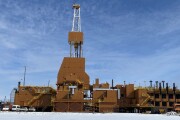About JPT
The Journal of Petroleum Technology, the Society of Petroleum Engineers’ flagship magazine, presents authoritative briefs and features on technology advancements in exploration and production, oil and gas industry issues, and news about SPE and its members.
Online, JPT includes exclusive content and features not found in each monthly issue. Also online, SPE members have free access to full-length SPE technical papers highlighted in each issue for a 2-month period. A JPT subscription is included with SPE membership dues.
Have a story idea? First, please review our recently updated guidelines below. To keep our coverage balanced and give space to a wide range of industry voices, we typically accept only one submission per person or company each year. Submissions must be non-commercial in nature. Case studies with field results are of particular interest. Contact JPT Editor Trent Jacobs via email.
Guidelines for Feature Articles
Guidelines for Guest Editorials
Discover the volunteers and staff responsible for JPT
EDITORIAL POLICY
SPE encourages open and objective discussion of technical and professional subjects pertinent to the interests of the Society. Society publications shall contain no judgmental remarks or opinions as to the technical competence, personal character, or motivations of any individual, company, or group. Any material which, in the publisher’s opinion, does not meet the standards for objectivity, pertinence, and professional tone will be returned to the contributor with a request for revision before publication. SPE accepts advertising (print and electronic) for goods and services that, in the publisher’s judgment, address the technical or professional interests of its readers. SPE reserves the right to refuse to publish any advertising it considers to be unacceptable.
JPT EDITORIAL GUIDELINES
JPT welcomes submissions of articles from both SPE members and non-members as well as from veteran and less experienced writers. JPT's objectives are to provide information about the latest upstream technology developments and applications, oil and gas industry news and trends, and other news and ideas pertinent to the E&P professional.
SPE maintains the highest editorial standards in its publications and expects guest authors to adhere to those standards. Guest articles should be written for the interest and benefit of JPT readers, which includes the entire SPE membership and is made up of engineers, geoscientists, managers, executives, consultants, and academia. Articles should not be written to promote a particular product or company.
JPT editors review all submissions for clarity, and will fact check and copyedit to comply with our style guide. All submissions are subject to the SPE’s AI-generated content policy and JPT reserves the right to reject submissions that do not meet our editorial standards, including those that to do not demonstrate originality, practical relevance to the upstream oil and gas sector, or value to practicing petroleum engineers and other technical professionals. We encourage contributors to submit work that reflects their own expertise, analysis, and perspective. Any substantial changes are cleared with authors before publication.
General Guidelines
Article submissions should be submitted in electronic format in Microsoft Word 12-point type and double-spaced. Omit page formatting and style codes. Spell out all units of measure and acronyms. Mention of trade and service marks is generally discouraged.
A short bio of the author—including current job title, company or organization, previous relevant jobs, degrees earned, and universities attended—and a photo of the author if available also should be included as separate attachments. The byline should include the author’s name, current job title, company, and note whether the person is a current member of SPE.
SPE’s Style Guide—which offers guidelines on usage, punctuation, abbreviations, and numbering of references and tables—can be found here: SPE Style Guide.
SPE’s rules of style are intended to promote clarity, conciseness, accuracy, and consistency. Because JPT has a global readership, it is important to avoid local terminology and to adhere to widely accepted modes of English expression. Clear writing is essential for the comprehension of readers from numerous geographic regions, nationalities, and language backgrounds. The use of equations and references should be kept to a minimum.
JPT does not accept articles that have been printed in other publications/websites or that have been simultaneously submitted to other publications/websites for review. It is understood that the article submitted is the author’s original work and contains no plagiarism or copyright violations.
JPT reserves the right to edit submitted articles; however, authors will be notified if significant editing changes are needed. Every attempt is made to preserve the integrity and voice of the original work.
Photos and Graphics
Photos and graphics, such as charts and tables, can be valuable additions because they attract the reader’s eye and clarify complex material. Color photos and graphics are preferred. They should be sent as separate attachments and not embedded in text.
Photos and graphics should be high resolution of at least 300 dpi and sent in jpg, tif, bmp, or eps format. Power Points are acceptable. Tables, charts, and figures should be clear and easy to read and follow the numbering and abbreviation guidelines laid out in the SPE Style Guide. Letters and numbers should be clear. Figure captions should be listed at the end of the article text and numbered sequentially in the order that they appear in the article.
Photos also should have individual captions, which clearly describe what is taking place in the photo, where the photo was taken, and include any necessary photo credit. Authors accept responsibility for obtaining the necessary rights to any photo or graphic.
Please contact JPT Editor Trent Jacobs via email before submitting an article or if you have any any questions regarding JPT’s editorial guidelines.
DCMA COMPLIANCE
In the event that you are a copyright holder and believe that material posted or found on this website infringes your copyright, please provide us with the information identified below, as required by federal law under the Digital Millennium Copyright Act (DMCA). Pursuant to the DMCA, we remove all allegedly infringing material and we may terminate, in appropriate circumstances, users and account holders of our system and network who are repeat infringers.
Pursuant to the Digital Millennium Copyright Act, Title 17, United States Code, Section 512(c)(2) [DMCA], notification of claimed copyright infringement should be sent to:
Society of Petroleum Engineers
Managing Editor, JPT
P.O. Box 833836
Richardson, TX 75083 U.S.A.
Telephone: 972-952-9393
Fax: 972-952-9435
Email: jpteditor(at)spe.org
Under the DMCA, to be effective, the notification must be a written communication that includes the following:
- a physical or electronic signature of a person authorized to act on behalf of the owner of an exclusive right that is allegedly infringed;
- identification of the copyrighted work claimed to have been infringed
- identification of the material that is claimed to be infringing or to be the subject of infringing activity and that is to be removed or access which is to be disabled, and information reasonably sufficient to permit us to locate the material
- information reasonably sufficient to allow us to contact the complaining party, such as an address, telephone number, and if available, an electronic mail address at which the complaining party may be contacted
- a statement that the complaining party has a good faith belief that use of the material in the manner complained of is not authorized by the copyright owner, its agent, or applicable law
- a statement that the information in the notification is accurate and, under penalty of perjury, that the complaining party is authorized to act on behalf of the owner of an exclusive right that is allegedly infringed.





